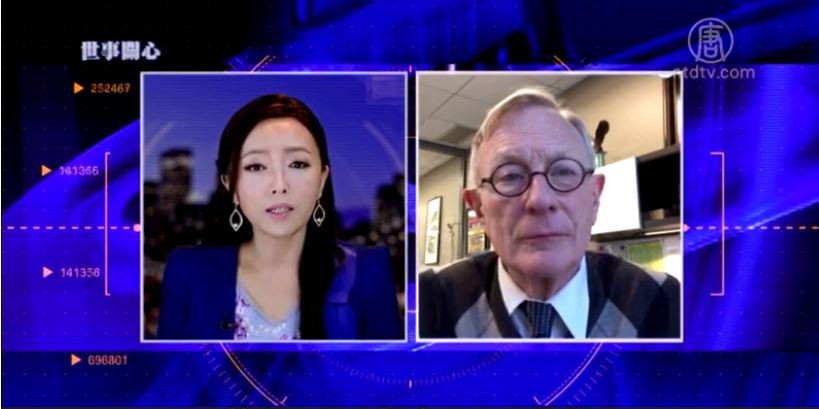
|
January 30, 2018
NTD Interview
|
|
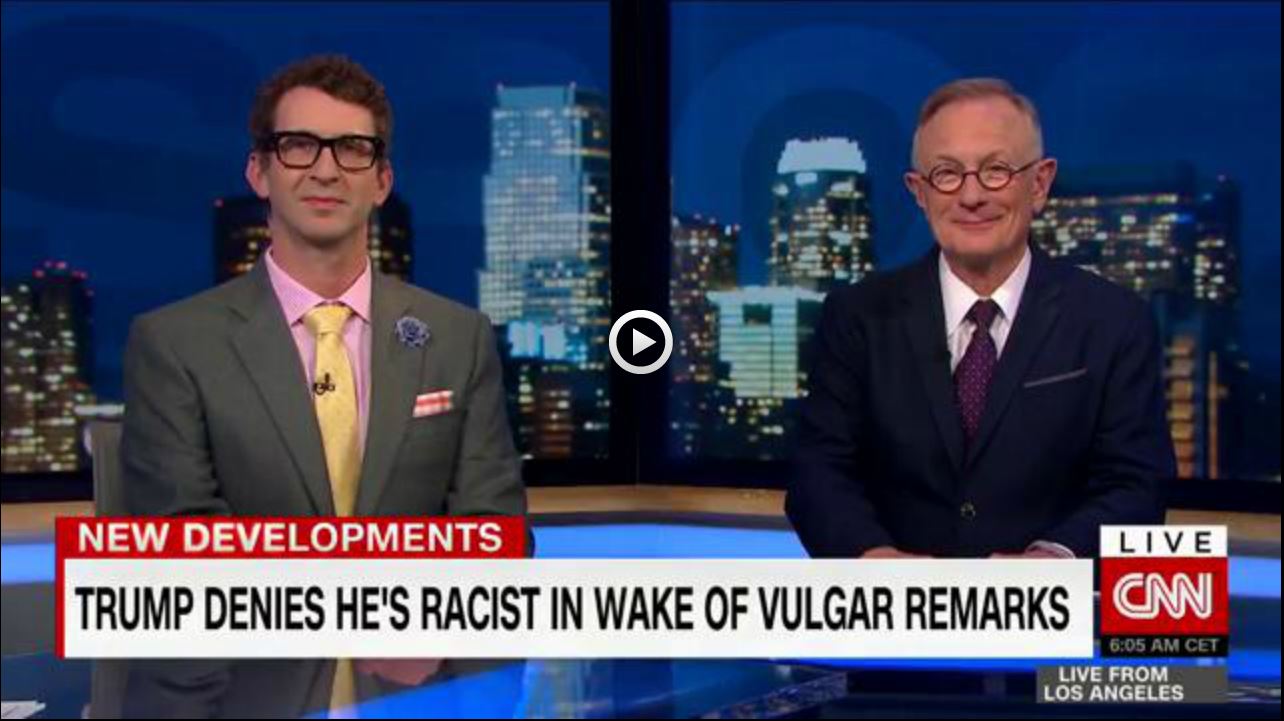
|
January 16, 2018
CNN Interview - Part 1
|

|
January 16, 2018
CNN Interview - Part 2
|
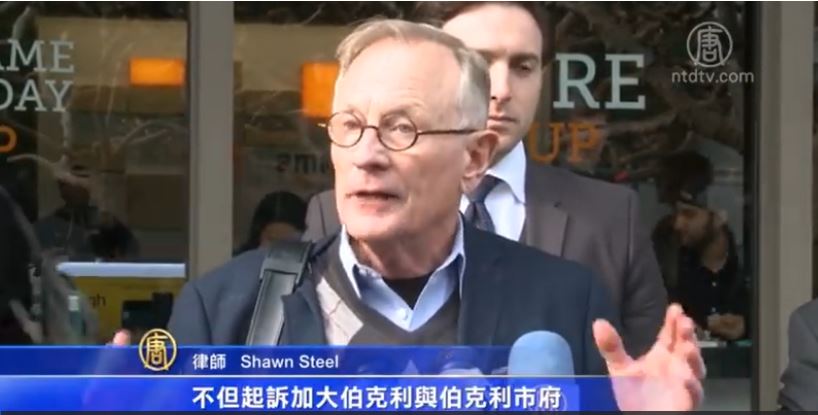
|
January 16, 2018
Press Conference
|
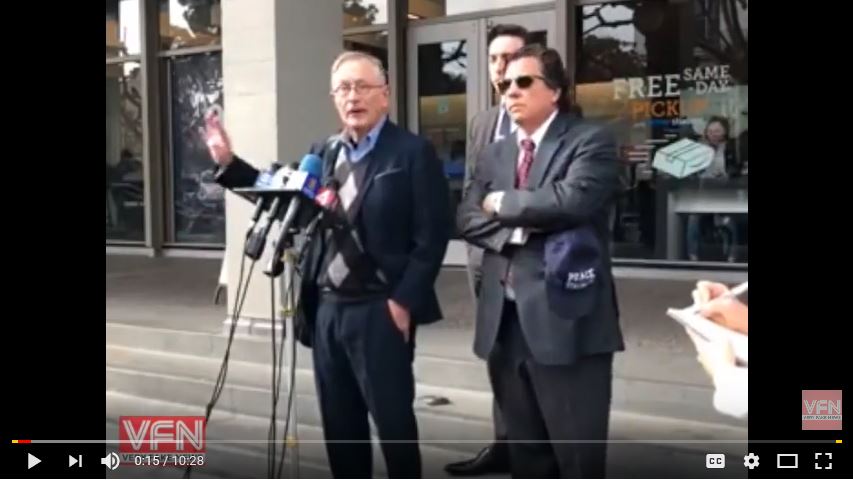
|
January 16, 2018
Press Conference
|
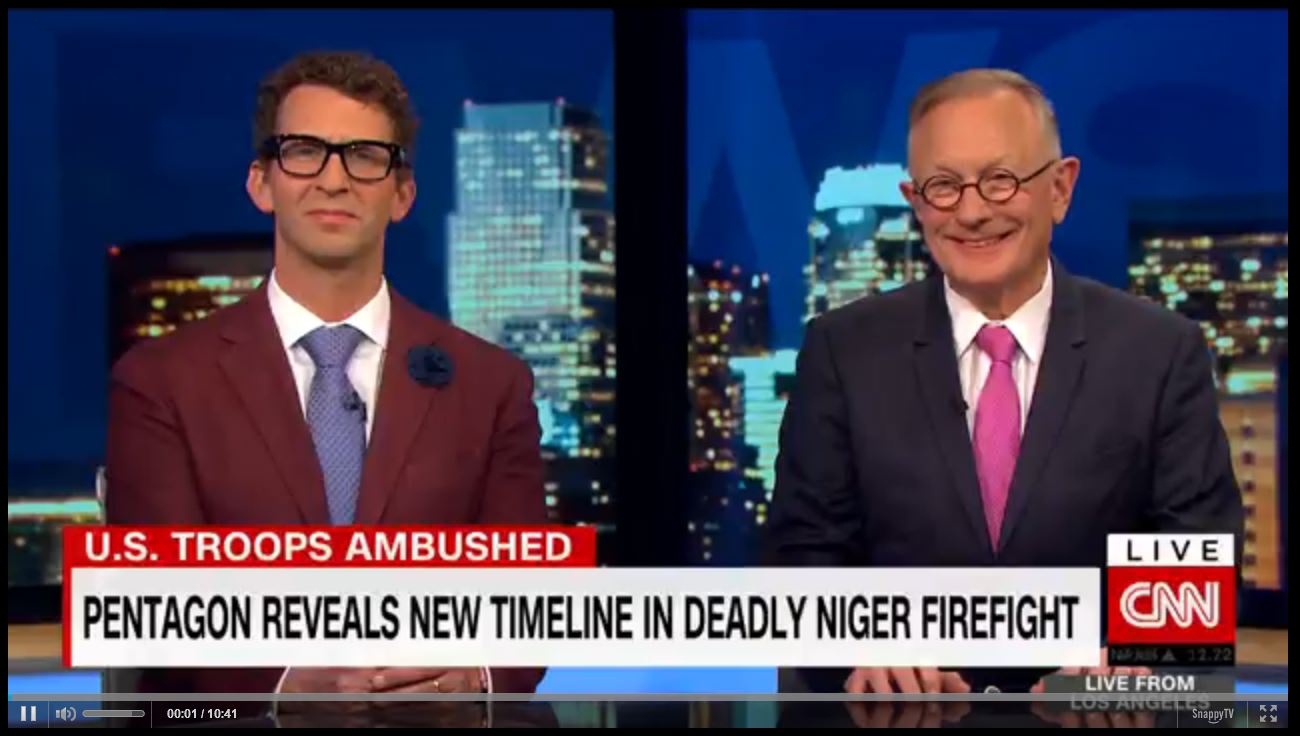
|
October 24, 2017
CNN Interview
|
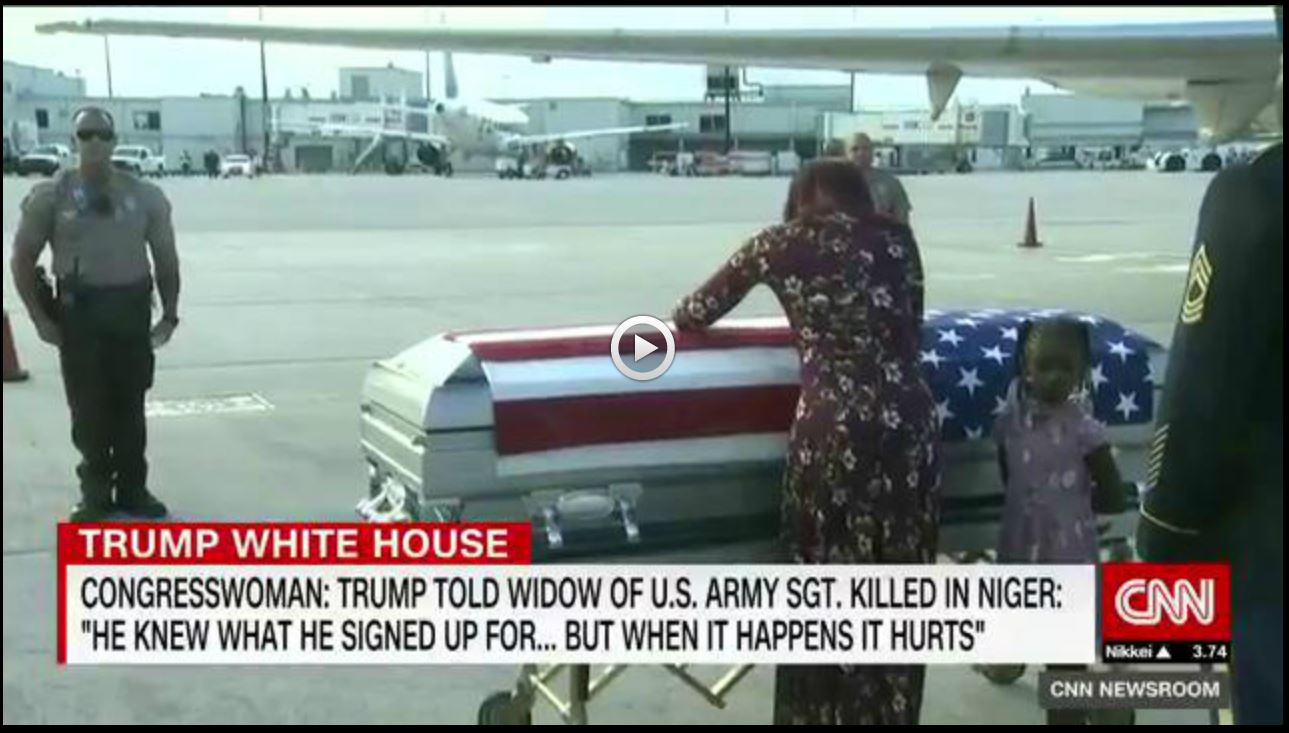
|
October 18, 2017
CNN Interview
|
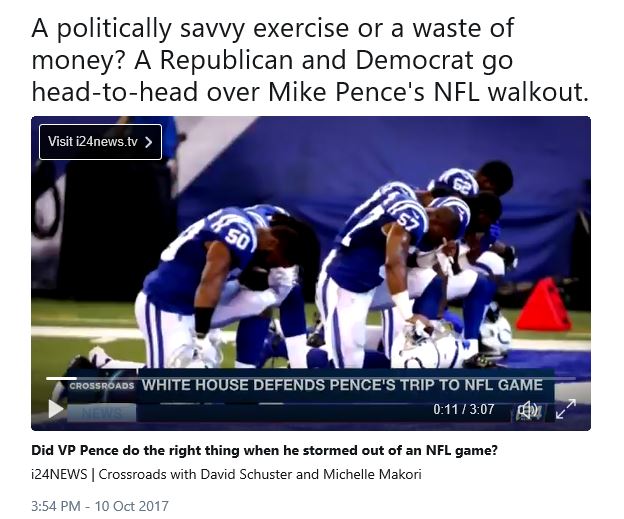
|
October 10, 2017
i24News Interview
|
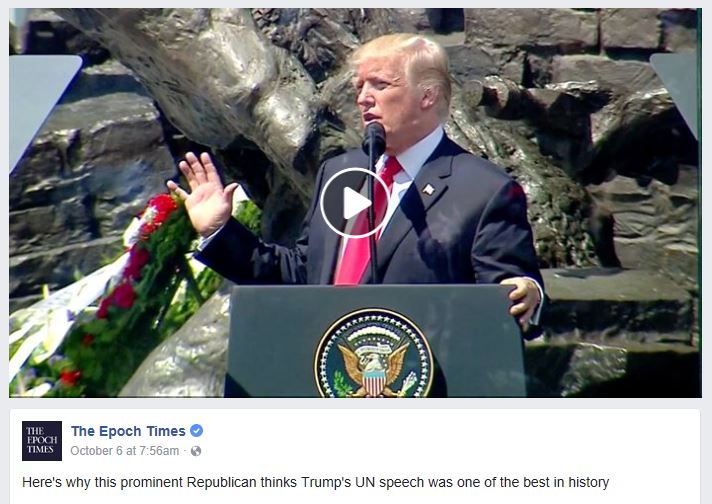
|
October 6, 2017
The Epoch Times Interview
|
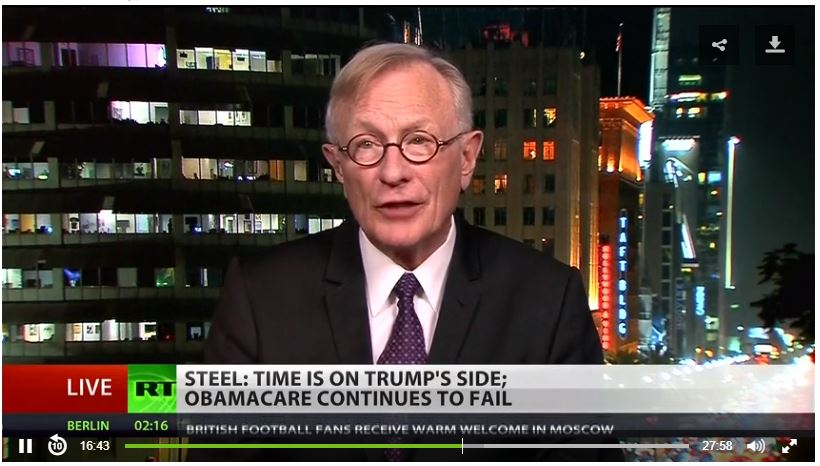
|
September 27, 2017
RT America Interview
|
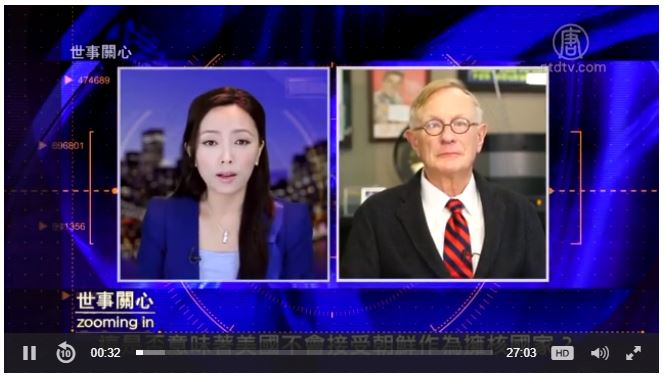
|
September 26, 2017
NTD Interview
|
|
|
|
|
|
|
|

The Emerging Mcclintock Era
December 01, 2005
Keep your eye on Tom. Everyone's noted the huge stakes the Special Election involves for Big Labor's special interest power struture, for the governor, and the future of California government, particularly the immediate, profound impact, should they pass, of paycheck protection (ending public employee unions' practice of taking from state workers, without permission, all the money the unions need to dominate the Capitol) and redistricting reform. But for the longer term, this election could have even greater significance for our state, depending on the results it brings, in what it means for the career of state Sen. Tom McClintock.
Sen. McClintock began to emerge as a formable statewide figure in 2003 when he resisted calls to withdraw from the recall election. Party leaders reproached his intransigence, but the senator knew better. His demeanor in the debates won him praise and helped define him as the smartest, most serious, and best informed guy in the room. Arnold was elected governor, but Tom emerged with the highest favorables statewide. The senator pulls more independents and Democrats. Now, for 2006, the man from Moorpark is running, so far unopposed, for the GOP lieutenant governor nomination. And the special election, like the recall earlier, is becoming as critical an event - perhaps, for the long term, an even more critical event - for the state in its McClintock as in its Schwarzenegger implications.
This special could advance the McClintock tide for years to come. Arnold - after trying to "negotiate" with legislative Democrats - eventually discovered that these supposed "leaders" were really pawns of the public employee unions. In effect, because they are so beholden to the massive funding the unions extort from all state workers, Democrat legislators hold no independent decision-making power. Arnold was stymied. He began threatening to use initiatives to go directly to the people. That brought us to this special election.
Due largely to his own political missteps, the governor enters the last few weeks before this election with all his political capital on the line while McClintock's stock continues to rise. The senator criticized some of Schwarzenegger's early moves, making their relationship at times frosty. But now, after tens of millions of dollars spent on largely unanswered TV attack ads against the governor, it turns out that McClintock's favorables exceed Schwarzenegger's. So - surprise! - the governor's handlers are asking Tom to join Arnold's campaign rallies. The governor's political advisors know the senator helps bring back independent and conservative Democrat voters. How ironic.
In addition, it's the overtly conservative initiatives that give this election most of its real drama. Parental Notification [Prop. 73] and Paycheck Protection [Prop. 75], incorporating core conservative principles, will, if passed, make a real, lasting difference in California, and the left-wing opposition knows it. But Arnold endorsed neither of them until the last minute while Tom was an early supporter of both. Without the governor, both these initiatives have prospered.
As to the governor's own propositions, teacher tenure [Prop. 74], mandating a minor, though still important, reform, is at least enough to bother the teachers union; Live Within Our Means [Prop. 76], a weakened substitute-for-a-cap spending control measure, was initially disapproved by McClintock and remains weak in current polls. The one really important measure in the governor's personal arsenal, redistricting reform [Prop. 77], is behind in several polls. This governor, however, may yet produce victories for Prop. 77 and possibly for 74 and 76 as well. But even should all three of the governor's measures lose, but either Prop. 73 or political earthquake Prop. 75 wins, he will still be able to claim victory in the Special Election and vindication for himself.
Any of these outcomes would be good news for McClintock. Each would likely give him zero 2006 primary opposition, permitting him, and Arnold, to march confidently toward the 2006 November general. The Team, I predict, would win an overwhelming victory. McClintock will serve as the governor's second term conscience. If Arnold then acts on half of McClintock's advice, California's business engine will explode into an unprecedented era of prosperity. Finally, conservatives can then look forward to a 2010 Tom for Governor movement, supported by a unified, grateful state GOP.
Oh, by the way, 2010 will mark 100 years since the election of the most dramatically and long-lastingly effective governor in state history: Hiram Johnson.

Schwarzenegger's Back
October 07, 2005
Before marching on the capital of the Aztec empire in 1519, Spanish conquistador Hernan Cortes burned his ships - cutting off the possibility of retreat and ensuring that his tiny army would either prevail or perish.
It's no great exaggeration to say Gov. Arnold Schwarzenegger faces a similar situation. For most of his brief governorship, he has been locked in mortal combat with the powerful public-employee unions over the direction of state government - a conflict of increasing in intensity as the Nov. 8 special election approaches.
Finally, last month, Schwarzenegger figuratively burned his ships by endorsing Proposition 75, the paycheck-protection initiative that would force those unions to obtain prior permission from members before spending dues for political purposes. A few days prior, he announced his intention to seek re-election next year - something he could easily have delayed until after the special election. Around the same time, three of his top advisers took leaves to take the reins of the governor's disjointed campaign apparatus.
During the past several months, as the unions hammered the Governator with tens of millions of dollars in attack ads, a sinking feeling took hold among Schwarzenegger supporters that the unions were the only ones who understood that the governor was in a fight to the finish.
Schwarzenegger has erased that doubt. The governor clearly understands he has crossed the Rubicon and has no option but to decisively settle the question of who governs California: the taxpaying middle and entrepreneurial classes, or their nominal servants in state and local government employee unions.
In hindsight, that has been the issue at the heart of the political upheaval that began with the Gray Davis recall and Schwarzenegger's election, and continues with the special election and next year's general election.
The stakes Nov. 8 are enormous for both sides. If voters reject his reform package, Schwarzenegger is weakened going into 2006, when he grapples again with the unions and the Democrat-controlled Legislature over the chronic budget deficit while running for re-election.
On the other hand, victory for his reform package entails dire consequences for the Democrat-union axis, because Props. 75 and 77 pose a very real threat to their power.
Democratic politicians freely admit that requiring public-employee unions to obtain prior permission before spending members' dues for political purposes is a "dagger aimed at the heart" of their party. Furthermore, by replacing the current gerrymandered legislative districts with fair and balanced lines drawn by a panel of retired judges - as happened after the 1990 Census - Prop. 77 will likely result in a much more moderate Legislature than our current one - whose leadership is far-left.
Thus, Schwarzenegger would enter the 2006 elections and budget negotiations with a voter mandate for change and the prospect of a Legislature more amenable to his structural reforms.
It's refreshing to hear Democrat politicians admit they utterly depend on involuntary political contributions from government employees, and fears are well-founded. Passage of either one of these initiatives is bad news for them - passage of both is a disaster.
Only a handful of California's 80 Assembly districts and 40 Senate districts are competitive, allowing the unions to concentrate their 2006 campaign spending in just a few districts. Prop. 77 would vastly increase the number of districts in play for 2006 elections and force the unions cover far more campaigns with the same prodigious, but finite, war chests.
At the same time, Prop. 75 bound to reduce their war chest. As a result, the unions will have less money to spend on more campaigns. This simultaneously dilutes the unions' influence while constricting a primary source of Democratic campaign finances.
The unions realized for months that this election is for all the marbles. By announcing for re-election and endorsing paycheck protection, Schwarzenegger signaled that he, too, realizes the special election is not just another campaign, but a case of "come back with your shield, or on it."

Will Arnold Jump The Shark?
May 17, 2005
The month of May will likely prove to be the tipping point of Arnold Schwarzenegger's governorship - when we will find out if he can fulfill the political destiny he set for himself during the Davis recall or if it marks the point when his political career "jumped the shark."
"Jumping the shark" is a term from the TV world, but it's perfectly applicable to politics as well. Its genesis is the infamous "Happy Days" episode in which water-skiing, leather-jacket- clad Fonzie jumped a man-eating shark - signaling the long-running sitcom had no good ideas left, and it was all downhill from there.
The governor's actions and comments during the last few weeks have left a number of observers - me included - wondering whether or not Schwarzenegger has jumped. It's not just how he's done little to respond to the relentless attacks from the public employee unions. It's the ping-ponging statements on immigration. It's the unnerving process of watching him jettison plank after plank from his reform platform, most recently the public employee pension-reform initiative. A tactical retreat can be a sound political maneuver - but too many of them and it becomes a rout.
The governor seems to have sensed this and is finally finding his footing again. For one, he is finally responding to the vicious pounding he's receiving from union attack ads for the last several weeks by airing an ad of his own, featuring the governator exhorting regular folks on the need to rein in and reform an out-of-control, spendthrift state government. The ad emphasizes the governor's strengths - his charismatic personality and devotion to the big picture of restoring the California dream.
Secondly, he is actually turning in signatures for reform initiatives. As of this writing, Schwarzenegger has submitted signatures for the merit pay initiative (of which I am a co-sponsor) and the redistricting initiative. Submittal of the paycheck protection initiative is also imminent.
It was absolutely critical that Schwarzenegger not back away from these measures. If he had decided to call it a day in the face of union attacks and pushed his reform initiatives off until the June 2006 primary, his opponents in the Legislature and the unions would have reacted naturally - like a pack of wolves catching the scent of a wounded elk.
After sounding like an uncertain trumpet of late, Schwarzenegger seems to be sending consistent signals again. He deep-sixed recent talk of watering his redistricting initiative down, and will go with the original plan of redrawing the lines as soon as possible.
The paycheck protection initiative is a fiery cannon shot across public employee union bows. The governor hasn't formally endorsed it, but he's sure made some warm and fuzzy sounds about it. What does he have to lose, after all? Blood has been drawn and battle lines formed. The public employee unions are in this fight to win; the governor gains nothing by restraint.
Winning on this initiative would significantly declaw government unions, which are nothing more than big government organized as a special interest. The unions only narrowly defeated a much-broader paycheck protection initiative in 1998 after outspending it 30 to 1. The support of a charismatic governor with lots of fund-raising muscle and much greater credibility and popularity with the public than the unions would put this public employee unions-only version over the top.
So has the governor jumped the shark? My answer is a tentative, hopeful "no" - or at least not yet. The game is still very much afoot and lots of variables can combine and recombine to scramble or enhance the governor's fortunes.
Still, Arnold has made a habit of confounding the conventional wisdom, and my gut tells me he will turn this cliff-hanger around in his direction. But only so long as he remembers that old Latin expression, audentes fortuna juvat: "Fortune favors the bold."

The Governor's Initiatives
March 10, 2005
Later this year, California will be the setting for the most important election since the presidential election - not a contest between two candidates but between the conservative future and the liberal past. Gov. Arnold Schwarzenegger will call a statewide special election on a slew of ballot propositions giving voters a choice between moving California in a forward-looking conservative direction or sliding backward into reactionary liberalism.
More than a year after the historic recall election, California still struggles to recover from the obscene state spending binge of the Gray Davis years. After a frustrating year of trying to work with the Democratic-run Legislature to fix the situation, the governor has decided it is time for a showdown. In his State of the State address, he took aim at several particularly septic areas of public life: government spending, public employee pensions, public schools and gerrymandered legislative districts.
Schwarzenegger will package his reforms as a series of ballot initiatives to restore fiscal and political sanity to California\'s body politic.
One initiative will target California\'s runaway structural deficit. A complex series of spending formulas consistently spikes spending ahead of revenues. Schwarzenegger wants to counterbalance that with some form of automatic restraint on spending to ensure expenditures don\'t exceed receipts.
A second would replace the state\'s 153 gerrymandered legislative and congressional districts with districts drawn by a panel of retired judges, which would thenceforth conduct the decennial redistricting. California did this after the 1990 census, and, as a result, control of the Assembly changed hands twice during that decade. Schwarzenegger\'s plan is for these new lines to be in place for the 2006 election.
Finally, Schwarzenegger wants to steer new government workers away from the defined-benefit public employee pension plans whose costs are spiraling out of control and into 401(k)-style defined-contribution plans, as well as implement merit pay for teachers and suspend the sacrosanct Proposition 98 guarantee of 40 percent of general fund revenues for K-14 spending.
California\'s reactionary liberal establishment has responded with its own bundle of ballot initiatives, including measures to dramatically boost corporate taxes, hike the state minimum wage to $7.75 per hour and index it to inflation, and force small businesses to provide health insurance to their employees.
One liberal group has submitted an initiative to provide \"affordable\" prescription drugs to all Californians, impose price controls, and slap taxes on pharmaceutical manufacturers and marketers to pay for administering the new program.
The union-front group \"California Tax Reform Association\" is behind a \"split-roll property tax\" initiative. Currently, Proposition 13 limits both commercial and residential property taxes to no more than 1 percent of the assessed value, and only allows reassessment when a property is sold. It is virtually our only tax advantage vis-a-vis other states. Under this labor-backed initiative, commercial property would be split onto a separate roll and regularly reassessed, allowing local and state governments to profit from skyrocketing property values. It would plunge a knife through the heart of Prop. 13 - which has been the dream of Establishment California since voters ignored their scare tactics to enact the landmark taxpayer protection in 1978.
This ballot initiative battle will be a straightforward issues-based contest between forward-looking conservatism and reactionary liberalism: fundamental reform based on liberty, free choice and government restraint versus a last, violent spasm of intellectually bankrupt liberal paternalism.
It is entirely possible Schwarzenegger will run the table. If the election comes down to whom voters trust, a majority of Californians will side with the Terminator.
Partisans across the country, not just in California, should watch this election closely. Schwarzenegger may not be a conservative in the traditional understanding of the word, but he is framing this fight in Reaganesque terms of liberty, opportunity and taming the government \"monster.\"
It is said that as California goes, so goes the nation. If Schwarzenegger wins this fight, both parties will have a lot to think about. CRO
Former Assemblyman Tony Strickland is president of the California Club for Growth Shawn Steel is Director California Club for Growth, a co-founder of the Davis recall campaign and immediate past chairman of the California Republican Party.

Initiatives At Home And Abroad
February 14, 2005
With the world's sixth largest economy, California has long served as the bellwether for national economic success. When California struggles, our whole nation suffers. Simply put, our nation cannot achieve a complete economic recovery until California's economy thrives.
That is why we have organized the California Club for Growth. The California Club for Growth is a supply-side economic group committed to economic growth through limited government and lower taxes. Modeled after the national Club for Growth, we firmly believe that we cannot tax our way to an economic recovery. With Ronald Reagan's favorite economist, Art Laffer, serving as chairman, we are working hard to make sure that California government turns toward economic expansion. We do not engage on topics concerning social or moral issues. We focus on economic freedom, but we frame that focus in Reaganesque terms of liberty, opportunity and taming the government "monster."
To achieve our goal, the California Club for Growth's political-action committee has an aggressive strategy to recruit, promote and elect leaders who believe that economic success requires lower taxes. Our primary method for success is by bundling small political contributions into meaningful support. Several years ago, the political activists at EMILY's List (Early Money Is Like Yeast) realized the power of bundling small contributions expressly for Democratic women. Instead of having one political action committee make a single contribution to a campaign, they asked their members to support candidates with their seal of approval. By bundling contributions, EMILY's List was able to elect its slate of candidates. A brilliant concept, of course, EMILY's List is a huge factor in the Democratic Party.
The Club for Growth works the same way. We interview candidates for state offices, research their background and economic philosophy. Once we select our candidates, we ask our members to provide maximum financial support. With a membership base of more than a thousand, one recommendation from the California Club for Growth can make any candidate viable. (By comparison, National Club for Growth raised more than $20 million in 2004 and elected numerous U.S. representatives and two senators.)
Because we are nonpartisan, we can maximize our impact by endorsing candidates in the primary election. Republicans and Democrats in the California Legislature should know that no party label or incumbency status will protect them. The California Club for Growth is watching. When politicians (particularly Republicans) raise taxes, the club will work to remove them from office.
Our organization also does not stop with the election of Club for Growth candidates. In order to ensure that our candidates continue to support sound economic policies, we track legislation, publish scorecards and update our members on important votes before the Legislature.
We are joining Gov. Arnold Schwarzenegger's reform movement by promoting initiatives directly to voters, avoiding politicians in Sacramento. It's a huge gamble. In support of the governor's agenda, the California Club for Growth has filed two initiatives to help him substantially redesign California's economic climate:
Our first initiative, Fair Competition and Taxpayers Savings Act, would allow local governments to contract with private companies if the goods or services can be provided cheaper. In his last year, Gov. Gray Davis signed legislation prohibiting local governments from contracting out services to California vendors. This limits competition and is unfair. This initiative will save taxpayers millions of dollars a year, simply by offering choice and competition.
We also are proponents of the Merit Pay Initiative that would give economic incentives for hard-working and capable teachers.
It is entirely possible that Schwarzenegger will hit a home run, winning with a number of initiatives this fall. To escape the economic recession of the early 1980s, President Ronald Reagan adopted aggressive supply-side economic policies. They helped produce one of the greatest economic expansions in history. Like Reagan, the governor also realizes that limiting government and lowering taxes is a proven formula for economic success.
This is a struggle that California Club for Growth is happy to join. CRO
Former Assemblyman Tony Strickland is president of the California Club for Growth Shawn Steel is Director California Club for Growth, a co-founder of the Davis recall campaign and immediate past chairman of the California Republican Party.
|
Articles
2025
2024
2023
2022
2021
2020
2019
2018
2017
2016
2015
2014
2013
2012
2011
2010
2009
2008
2007
2006
2005
2004
2003
2002
2000
1998
1996
|